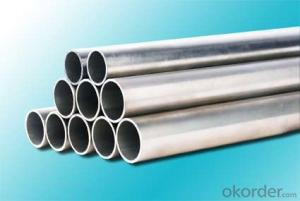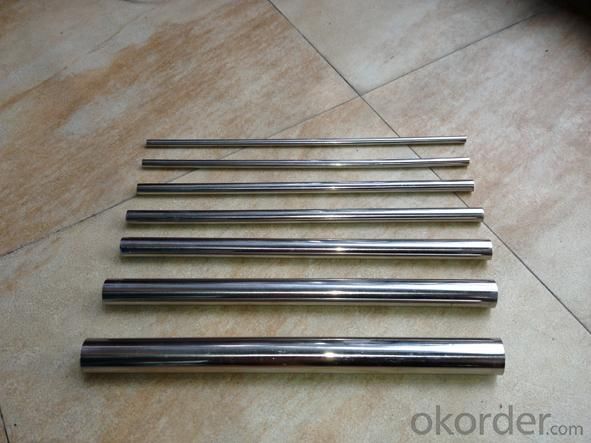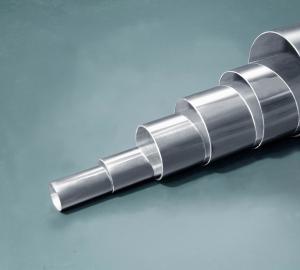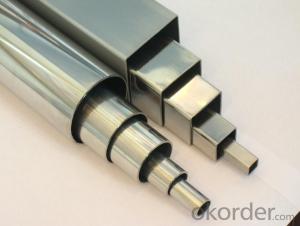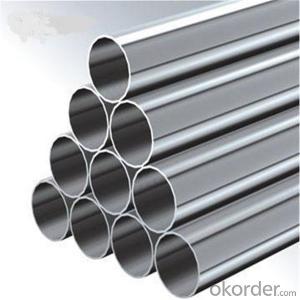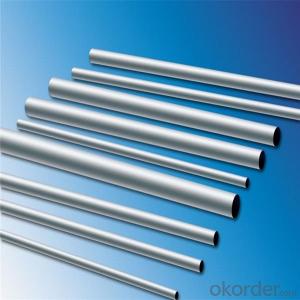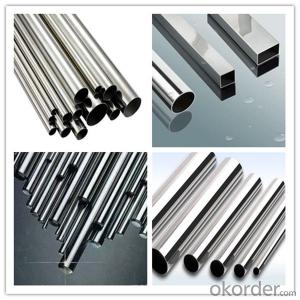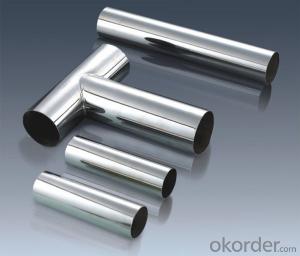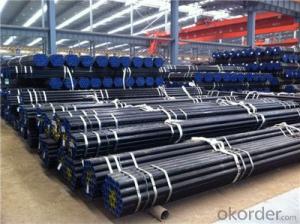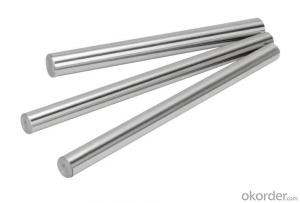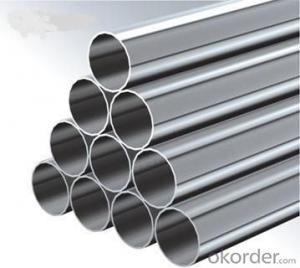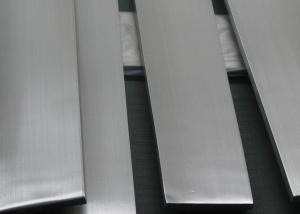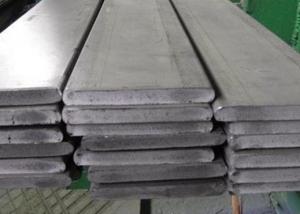Steel Manufacturing Company 304 Stainless Steel Pipe Price Per Meter
- Loading Port:
- Tianjin
- Payment Terms:
- TT OR LC
- Min Order Qty:
- 25 m.t.
- Supply Capability:
- 1000 m.t./month
OKorder Service Pledge
OKorder Financial Service
You Might Also Like
Quick Details
| Standard: | JIS,AISI,ASTM,GB,DIN,EN | Place of Origin: | China (Mainland) | Brand Name: | OKORDER |
| Model Number: | 200, 300 series | Type: | Seamless | Steel Grade: | 300 Series |
| Application: | Industry and decoration,Construction and decoration | Certification: | SGS | Welding Line Type: | Spiral Welded |
| Thickness: | 0.4-30mm, or customized | Outer Diameter: | 6-630mm, or customized | Material: | 201,202,304,304L,304N,304LN,309S,310S,316,316L |
| LENGTH: | 2000-6000mm, or customiazed | Surface: | Pickled,80grit,160grit,600grit,polished finish, bright finish | MOQ: | 500 kg |
| Payment terms: | T/T,L/C at sight | Advantage: | stable spec & accurate dimension | TECHNOLOGY: | seamless |
| INNER DIAMETER: | 5-600mm, or customized |
Packaging & Delivery
| Packaging Detail: | Products are well packed and clear labeled according to the regulations and customer's requests. |
| Delivery Detail: | 3-15days after receiving deposit |
Specifications
Stainless steel pipe
1.Material:301,304,316,430,etc
2.surface: 2B, No.1, BA,8K etc
3.Diameter:6~630mm
Steel Manufacturing Company 304 Stainless Steel Pipe Price Per Meter
- Q: How much more expensive is 304 stainless steel than 201?
- 201 in the stainless steel industry, represents a kind of material, 201 stainless steel is generally refers to 201 stainless steel and acid resistant steel floorboard. 201 stainless steel refers to the atmosphere, steam, water and other weak medium corrosion of steel, while acid resistant steel refers to acid, alkali, salt and other chemical corrosive medium corrosion of steel.
- Q: Can stainless steel pipes be lined?
- Yes, stainless steel pipes can be lined. Lining stainless steel pipes is a common practice to enhance corrosion resistance, prevent contamination, or improve flow characteristics. Various lining materials such as plastic, rubber, or ceramics can be used to line stainless steel pipes based on the specific requirements and applications.
- Q: Stainless steel pipe chamfering how to process?
- If the amount of larger or longer steel pipe, you can buy a dedicated handheld steel pipe chamfering tool, called "steel chamfering machine"". This is much more efficient than using a lathe.
- Q: Can stainless steel pipes be recycled?
- Yes, stainless steel pipes can be recycled. Stainless steel is a highly recyclable material due to its durability and corrosion resistance. When stainless steel pipes reach the end of their useful life or are no longer needed, they can be collected, processed, and melted down to create new stainless steel products. Recycling stainless steel pipes not only helps conserve natural resources but also reduces energy consumption and emissions associated with mining and manufacturing new materials.
- Q: Can stainless steel pipes be used for chemical refineries?
- Yes, stainless steel pipes can be used for chemical refineries. Stainless steel is highly resistant to corrosion, making it an ideal material choice for handling various chemicals and corrosive substances commonly found in refineries. Its durability, high strength, and ability to withstand extreme temperatures make it suitable for the demanding conditions of chemical refining processes.
- Q: What is the difference between seamless and electric resistance welded stainless steel pipes?
- The main difference between seamless and electric resistance welded stainless steel pipes lies in the manufacturing process. Seamless pipes are made from a solid stainless steel billet, which is heated and then stretched over a series of mandrels to create the desired shape and size. This process ensures a uniform and continuous structure without any welds. On the other hand, electric resistance welded pipes are made by forming flat stainless steel sheets into a cylindrical shape and then welding the edges together using an electric current. This results in a visible seam along the length of the pipe. While both types of pipes have their advantages and uses, seamless pipes are generally considered to have superior strength, corrosion resistance, and a smoother interior surface, making them suitable for applications where durability and cleanliness are crucial.
- Q: How do stainless steel pipes compare to carbon fiber pipes?
- Stainless steel pipes and carbon fiber pipes have their own unique characteristics and are used in different applications. Stainless steel pipes are known for their durability and strength. They are highly resistant to corrosion and can withstand high temperatures and pressures. This makes them suitable for various industries such as oil and gas, chemical, and construction. Stainless steel pipes have a longer lifespan and can handle heavy loads, making them a reliable choice for many applications. However, stainless steel pipes are relatively heavy and may require additional support structures. On the other hand, carbon fiber pipes are lightweight and have a high strength-to-weight ratio. They are made from carbon fibers embedded in a resin matrix, resulting in a strong and rigid material. Carbon fiber pipes are commonly used in industries such as aerospace, automotive, and sports equipment. The lightweight nature of carbon fiber pipes allows for increased fuel efficiency in vehicles and improved performance in sports equipment. However, carbon fiber pipes are more expensive than stainless steel pipes and may not be as resistant to extreme temperatures or corrosive environments. In summary, stainless steel pipes are known for their durability and resistance to corrosion, making them suitable for heavy-duty applications. Carbon fiber pipes, on the other hand, are lightweight and offer high strength-to-weight ratio, making them ideal for applications where weight reduction is critical. The choice between stainless steel and carbon fiber pipes ultimately depends on the specific requirements of the application and the trade-offs between cost, weight, and performance.
- Q: Can stainless steel pipes be used for architectural applications?
- Yes, stainless steel pipes can be used for architectural applications. Stainless steel is a durable and versatile material that offers a range of benefits for architectural purposes. It is corrosion-resistant, which makes it suitable for outdoor applications where it may be exposed to harsh weather conditions. Additionally, stainless steel pipes are aesthetically pleasing and can provide a modern and sleek look to architectural designs. They can be used for various architectural elements such as handrails, balustrades, structural supports, and decorative features. The strength and reliability of stainless steel pipes also make them suitable for load-bearing applications, ensuring the safety and stability of architectural structures. Overall, stainless steel pipes offer a combination of functionality, durability, and aesthetics that make them a popular choice for architectural applications.
- Q: What is the difference between Schedule 5 and Schedule 10 stainless steel pipes?
- Schedule 5 and Schedule 10 stainless steel pipes are both commonly used in various industries and applications, but there are some key differences between the two. The main difference lies in their wall thickness. Schedule 5 stainless steel pipes have a thinner wall thickness compared to Schedule 10 stainless steel pipes. This means that Schedule 5 pipes have a higher internal diameter, allowing for a greater flow of fluids or gases through the pipe. Schedule 10 stainless steel pipes, on the other hand, have a thicker wall thickness, resulting in a smaller internal diameter. This makes them more suitable for applications that require higher pressure or strength, as the thicker walls provide increased durability and resistance to external forces. Additionally, the different wall thicknesses of Schedule 5 and Schedule 10 pipes affect their weight and cost. Due to the thinner walls, Schedule 5 pipes are lighter and less expensive than Schedule 10 pipes. In terms of availability, Schedule 10 stainless steel pipes are more commonly used in industrial processes that involve high pressure or corrosive environments, such as chemical plants or oil refineries. Schedule 5 stainless steel pipes are often used in applications where the flow of fluids or gases is not under extreme pressure, such as plumbing or low-pressure conveying systems. In summary, the main differences between Schedule 5 and Schedule 10 stainless steel pipes lie in their wall thickness, internal diameter, strength, weight, and cost. The choice between the two depends on the specific requirements of the application and the level of pressure or durability needed.
- Q: How do you prevent pitting corrosion in stainless steel pipes?
- To avoid pitting corrosion in stainless steel pipes, there are several steps that can be taken: 1. Select the appropriate grade of stainless steel: Not all stainless steels are equal. Opt for grades that have higher corrosion resistance, such as 316 or 904L, which contain molybdenum and offer better protection against pitting corrosion. 2. Ensure proper alloy composition: Make sure that the stainless steel pipe contains the correct amount of alloying elements like chromium and molybdenum. These elements create a protective layer on the steel's surface, enhancing its resistance to corrosion. 3. Regularly clean and maintain the pipes: Clean the stainless steel pipes on a regular basis to remove any contaminants or deposits that could contribute to pitting corrosion. Avoid using abrasive materials or cleaners that might harm the protective layer. 4. Minimize exposure to aggressive environments: Reduce the stainless steel pipes' exposure to aggressive substances such as chloride ions, acidic solutions, or high temperatures, as these can accelerate pitting corrosion. If exposure is unavoidable, consider applying protective coatings or linings to create a barrier between the steel and the corrosive environment. 5. Employ cathodic protection methods: Implement techniques like sacrificial anode systems or impressed current systems to safeguard the stainless steel pipes. These methods create a potential difference between the stainless steel and a more susceptible metal, diverting corrosion away from the stainless steel. 6. Control water chemistry: If the pipes are used in water applications, monitor and control parameters such as pH, temperature, and chloride levels. Adjusting these factors within acceptable limits can help prevent pitting corrosion. 7. Adhere to proper design and installation practices: Ensure that the stainless steel pipes are designed and installed correctly, considering factors such as avoiding crevices, ensuring proper drainage, and preventing stagnant areas where corrosion can occur. Proper insulation and the use of compatible gaskets or flanges can also prevent pitting corrosion. By following these preventive measures, the risk of pitting corrosion in stainless steel pipes can be significantly reduced, leading to a longer lifespan and maintained structural integrity.
Send your message to us
Steel Manufacturing Company 304 Stainless Steel Pipe Price Per Meter
- Loading Port:
- Tianjin
- Payment Terms:
- TT OR LC
- Min Order Qty:
- 25 m.t.
- Supply Capability:
- 1000 m.t./month
OKorder Service Pledge
OKorder Financial Service
Similar products
Hot products
Hot Searches
Related keywords

